MWC Chair’s Annual Report for 2022
Delivered by MWC Chair Peter Sale at MWC’s Annual General Meeting held on January 20, 2023.
Our last AGM, on 22nd April 2022, seems a very long time ago. The Muskoka Watershed Council has been busy, and, from where I sit it has seemed that we were barely keeping our heads above water despite the effort being made. MWC is its members, and I know that many of you also feel it has been a particularly busy year. Part of the reason for this busyness was that we were continuing a full program of outreach and projects but were also doing some vital navel-gazing as well.
MWC Succeeds Because Our Members Contribute Where and How They Can
I’ll detail some of our accomplishments in a moment but I first want to acknowledge, with sincere thanks, the very real efforts made by so many of you. Every Director took on responsibility for important projects, and many of the wider membership were similarly engaged. Let me single out the two Directors appointed to our board by the District of Muskoka. It would not be unreasonable for municipal councillors appointed to our board to see their role as simply to provide liaison between MWC and DMM. But Nancy Alcock and Mike Peppard rolled up their sleeves and contributed fully to our deliberations in a way indistinguishable from that of our elected Directors. MWC has long had the benefit of committed municipal reps, but never have we asked so much of them. To begin with, the board has been meeting nearly monthly since early 2022 instead of the statutory minimum of four times a year. And Directors inevitably were engaged in all our navel-gazing. In any event, I particularly thank Nancy and Mike, and am pleased that while ‘Mayor’ Nancy has stepped down from the Board, she remains one of the District of Muskoka representatives on the Watershed Council.
As for contributions from the wider membership, I am not going to embarrass those who have given the most, but I can report with regret that one member had to resign because the time she gave to MWC detracted from her ability to do her real job, the one that pays her salary. MWC will miss her, and we hope she does not go too far away, but her predicament is shared by others who are younger and still in harness for a paycheck – one of the challenges we face in trying to ensure that the ‘wise old greybeards’ do not totally dominate our activities. Finally, I’d be remiss not to thank the District of Muskoka for its generous support, in many ways, including time of staff such as Rebecca Willison, Cassie Emms and Alana Perez. Our partnership with DMM is strong and valued.
Navel Gazing or Building our Structures and Procedures
I’ve twice mentioned navel-gazing, by which I mean doing those things a newly incorporated not-for-profit needs to do to ensure it has the structures and the procedures appropriate for its operation. We had begun a concerted effort to put our house in order during 2021; that continued in 2022 and there are items later in the agenda which result from that. Our Policies & Procedures document, which supports our by-laws, has now been substantially revised and brought up to date. Director David Parsons, who guided us through the finalization of our by-law revisions last year, did a commendable job of leading the re-creation of the policies document. We now have in place a Finance Committee, a Fundraising Committee, and a Membership Committee, each with terms of reference and written operating procedures. None of these existed previously and they will serve us well as our activities expand – I say that as someone who does not believe in building unnecessary bureaucracy. We also continued a strategic planning exercise that had commenced in 2020 with an extensive survey of community opinion about MWC under the leadership of former Vice Chair, Karen Maxwell. Director Pete LeMoine and past Chair Geoff Ross have ably led the strategic planning; it also comes up later in the agenda.
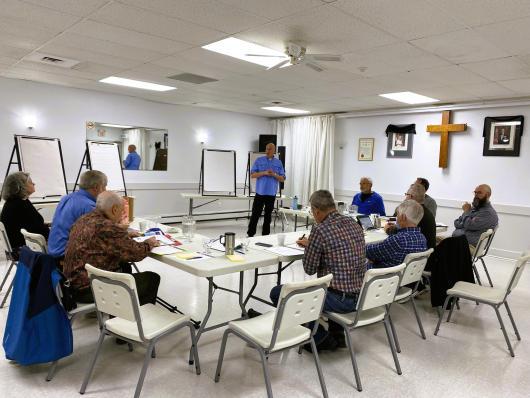
MWC Projects in 2022
- Becoming Real Again After Too Long in a Virtual World
But what you really want to hear about is the events, activities, projects that MWC accomplished during 2022. As Spring moved into summer, we tried valiantly to make our monthly Watershed Council meetings real again, encouraging in-person attendance, with Zoom retained for those at a distance. I got to meet some newer members of MWC for the very first time! We also tried to make the meetings places where council members would participate more actively in the issues on the agenda, returning to a style from several years ago. In doing this, we suspended meetings of the Working Group since those meetings seemed to be taking away from the Council meetings, leaving the latter as places to sit passively listening to presentations, usually from outside MWC. This had not been the objective in setting up the Working Group, and it may get brought back but operating differently than it had been. Council meetings will continue to include presentations on relevant topics from individuals from other organizations, but there will also be more time to delve into our own projects.
MWC also resumed non-virtual interactions with the community, being an exhibitor at Muskoka Earth Festival, HPS Eco-Fest, and May SeedPOD events, and making presentations to several Lake Associations through the season. We are starting to think about restarting our Stewardship Conferences, possibly in 2023. So much of what we seek to do depends on person-to-person interactions that the sooner we can return to a near-normal, non-virtual way of interacting, the better.
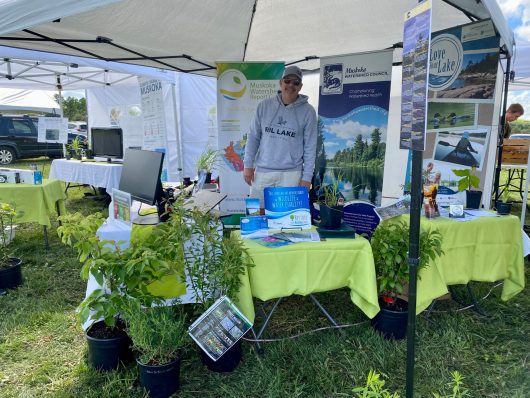
- Delegating to Municipalities and Reviews of Draft Official Plans
In 2022, MWC resumed annual delegations to municipalities. Resumed and expanded because the 16 visits to municipal councils this year included visits to 8 councils that we had never delegated to previously. It is time for MWC to recognize that our watershed includes a number of councils we have had little contact with. The presentations this year were primarily an introduction to MWC and to our project to build a collaborative, integrated, holistic, watershed-scale management approach across the watershed. These important visits were handled by a team of members including Directors Neil Hutchinson, Pete LeMoine, Kevin Trimble, Vice Chair Aaron Rusak, and MWC members Andrew Fyfe and Kathleen Hedley. We will shortly be scheduling delegations for this year, and I am looking for volunteers, particularly of non-Directors able to delegate to their own municipality.
As well as delegating, MWC served two municipalities, Muskoka Lakes and Seguin Townships, that were revising their Official Plans. Once each draft OP was posted for public comment, MWC teams undertook a careful review and the development of detailed written comments. Members Andrew Fyfe and Jess Lario joined me for Seguin Township and members Patricia Arney, Geoff Ross, Andrew Fyfe, Jess Lario, and Jo-Anne Goodwin joined me for Muskoka Lakes. To all these people, my thanks for wading through the interminable prose which is an Official Plan and making constructive comments. We anticipate at least two more Official Plans to review in 2023, and I’d welcome adding new members to the reviewing teams. You do not need to be an expert on OPs to join a reviewing team; you just need to be able to reflect on how policies and regulations can either help or hinder environmental sustainability.
- Recognizing Stewardship in the Community
In 2022, our Doug Cross Stewardship Recognition Program, set up in memory of former MWC member Doug Cross, supported 14 organizations across Muskoka in honoring individuals or families for their efforts to protect our watershed. Indeed, at our June meeting, I had the delightful task of announcing our own recipient, and handing the certificate to a flabbergasted Caroline Konarzewski, who had not seen this well-deserved compliment coming. This was also the 4th year that MWC worked with the Three Mile Lake Association to give out the Robert Allen Memorial Stewardship Award to a deserving member of that association.
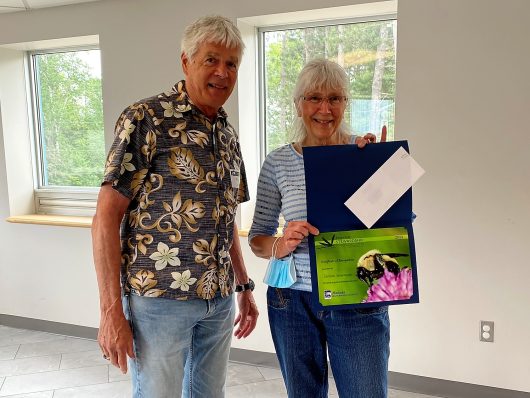
- Hands-on Projects in the Community
Collaborating with District of Muskoka, our venerable Love Your Lake and Natural Edge shoreline restoration programs were both active in 2022. Love Your Lake conducted 681 shoreline surveys across four lakes – Ril Lake and Echo Lake in Lake of Bays Township, Bass Lake in Muskoka Lakes Township and Morrison Lake in the Town of Gravenhurst. At each lake our team worked in collaboration with the lake association to carry out surveys. The Natural Edge program provided 21 site visits to properties across 12 waterbodies, sold 9 shoreline re-naturalization starter kits and distributed 553 native plants appropriate for the sites being re-naturalized. As well, a workshop on how to restore or maintain a natural shoreline buffer was held for the Mary Lake Association.
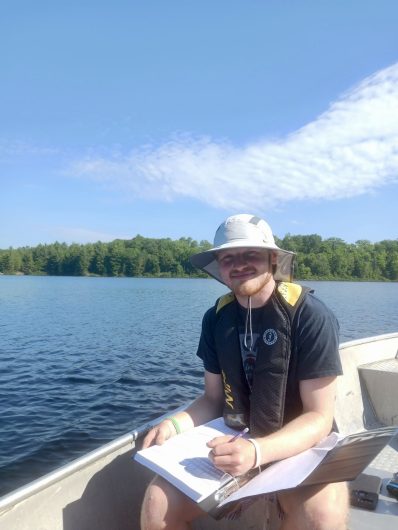
MWC’s Algae Monitoring Program expanded from 5 lakes to 12 lakes in 2022. On each lake, MWC partners with the lake association to monitor algal abundances bi-weekly from early summer through the Fall. Lake association volunteers take water samples at two or more sites using a standard protocol. The samples are frozen until convenient dates late in the season when they are thawed and assessed fluorometrically to provide an index of the total availability of algae in the water column and an index of the availability of blue-green algae in the water column. By taking this approach, we are collecting information on the behavior of the algae when they are not forming visible blooms. Long-term, by collecting information of this type, we may be in a better position to identify patterns in bloom occurrence – where, when, under what circumstances – and these patterns may lead to possibilities for preventing algal blooms or at least reducing their frequency in our lakes.
The original partners in this program are Brandy Lake Association, Leonard Lake Stakeholders Association, Muskoka Lakes Association (for Clark Falls, Lake Rosseau), Peninsula Lake Association and Three Mile Lake Association. The new partners in 2022 are Kawagama Lake Cottagers’ Association, Lake Vernon Association, Mary Lake Association, Menominee Lake Association, Ril Lake Association, Six Mile Lake Cottagers’ Association and Stewart Lake Association. (The Ril Lake team was unable to complete the sampling this year.) The Annual Report for 2022 should be available before we begin the 2023 season in May. As in 2022, MWC is hoping to add additional lakes in 2023.
- Building Advanced Management of Environmental Conservation and Land Use Planning
The Integrated Watershed Management project was perhaps our most prominent project in 2022 – certainly it was responsible for the greatest number of meetings of members and other interested people. At the request of the District of Muskoka, we had formed a community round table (CRT) to bring together the perspectives and ideas of a broad range of participants from across the watershed. This group met via Zoom 13 times during 2022, usually for two hours. The majority of these meetings were for the purpose of hearing reports from the consultants and providing feedback for each of the 12 baseline IWM projects being managed by the District of Muskoka. With the recent completion of those projects the IWM/CRT group is now commencing the task of articulating a common vision for the watershed a couple of decades into the future and strengthening participants’ understanding of integrated watershed management and the reasons why we need to bring advanced environmental conservation and land use management to this region. Next steps will be to delineate the steps forward on the path towards building a watershed plan.
This is, by far, the most ambitious project MWC has ever taken on and I want to thank Director Kevin Trimble and Geoff Ross for managing a difficult beast so well. It will only be achieved if we can build a broad coalition across the watershed, engaging other environmental groups, critical economic sectors, all 17 municipal governments and their staffs, and the wider community across our watershed. And it will take a decade or more to achieve.
Is IWM too ambitious a project for MWC? Definitely not. In many ways, MWC has been advocating for enhanced conservation and land use planning since its inception. The need for such changes has become greater year by year as development pressure mounts and as climate change, biodiversity decline and other environmental threats grow larger. And MWC has the track-record for providing unbiased, apolitical, science-based policy recommendations and a proven ability to collaborate broadly with non-governmental bodies and with municipalities and other regulatory authorities. If MWC does not provide the leadership necessary to build the coalitions required to bring in enhanced management, what other body is likely to be able to step forward successfully? In any event, we can anticipate that advocating for integrated, watershed-scale management of environment is likely to be a major part of what MWC does in future years.
- The 2023 Muskoka Watershed Report Card
Beginning in October 2022, the Report Card Sub-committee was reactivated to begin the production of MWC’s 6th Report Card due for publication early in summer of 2023. This is a very short timeline for producing a Report Card, but it is essential that it come out on time; the last report card appeared in June 2018. Our Report Cards are seen by some as the most important project we do, because they encapsulate a clear, data-based evaluation of the health of our watershed at a specific time. As the committee begins drafting the report, we do not anticipate any major surprises, but with five previous reports over the last 20 years, it is appropriate to emphasize trends in the data. Trends have been mentioned in past Report Cards, but this time they will be highlighted for one simple reason. The watershed remains in remarkably good health despite the greatly increased use and the impacts of other factors such as climate change, but there are a number of troubling trends. These trends are not going to be reversed by continuing current management practices. That these trends exist is a strong argument for why we need to implement a more holistic, more integrated, and definitely a watershed-scale approach to environmental conservation and management. Otherwise, we will continue to produce report cards showing a slightly deteriorated environment until one day we will discover that we have lost the magnificent environment that presently typifies this wonderful part of Ontario. Suddenly, the main message from our new Report Card is going to be the central message of our IWM project.
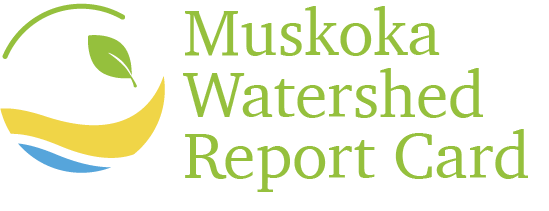
Onward to 2023
In summary, 2022 has been a busy and productive year for the Muskoka Watershed Council, and 2023 looks to be much the same. We are engaged in a broad range of activities, certainly ones that can benefit from the experience and expertise of every one of our members. We also will benefit by adding some new members because there is more than enough work to go around. In fact, if you know of someone who might be interested in bringing their skills to MWC, or if you see some topic that deserves attention, talk to any of the Directors. When you volunteer for MWC, you bring your ideas, your wisdom, and your connections, as well as your time and your capable hands; MWC needs all of every one of you.
In a time when governments can draft legislation as flawed as Ontario’s Bill 23, which MWC protested strenuously, the need for the Muskoka Watershed Council to provide its well-informed, objective, apolitical and non-partisan advice is greater than ever. The health of our watershed and through that, the health of our community depends on what we are achieving as the Muskoka Watershed Council. I, for one, am looking forward to 2023.
